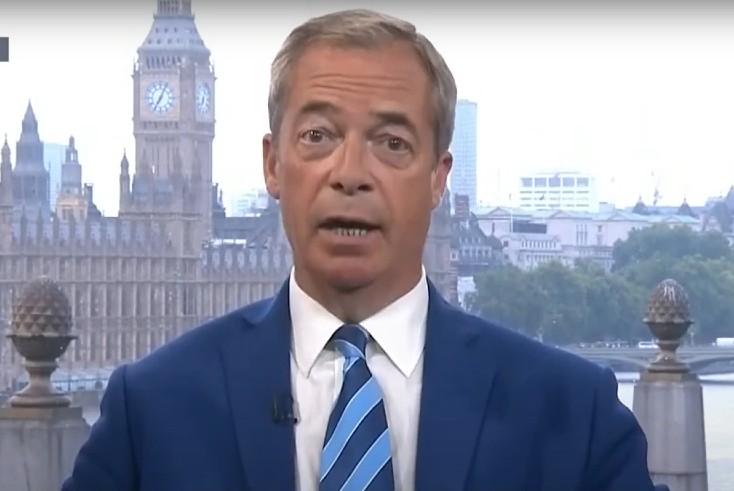Twitter on TV: the real reasons why advertisers avoid GB News

Opinion
There isn’t some conspiracy; advertisers want to sit beside the benign and predictable, not the combustible.
Many of you will be now be heartily full up with stories about GB News after last week’s fiasco, but hopefully you have enough appetite left to digest one more helping on this subject.
There are remarkable similarities between the goings-on at Twitter (and, no, I’m not going to call it ‘X’) since Musk took over and the story of GB News since it launched. These parallels show why media that are ideologically-driven do not provide a conducive environment for advertising.
When Musk took over Twitter last October, he claimed that there was (and is) a boycott of Twitter by its advertiser clients and their agencies and/or shadowy groups who are anti-free speech.
GB News claims the same and that advertisers are boycotting them for political reasons, spurred by pressure groups that are ideologically motivated.
They are both incorrect but it suits their agenda to claim that they are being boycotted. They champion free speech and adopt a libertarian approach to their content.
However, advertisers are not led by political considerations because their audiences come in all shapes, sizes and hues of thought. They do not set out to alienate their customer base.
Brand-owners are much less interested in politics than the politicians, and their consumers much less so.
Despite protestations to the contrary, advertisers are also not mysteriously corralled by pressure groups such as the Conscious Advertising Network and Stop Funding Hate; every advertiser makes their own decisions.
In truth, advertisers are choosing to avoid GB News because it doesn’t fulfil the basic requirements for inclusion.
Not of interest
For example, the GB News presenter Nigel Farage (who needs no introduction) tweeted recently that it was “a massive day for British broadcasting and for GB News,” because GB News had beaten Sky News, BBC News and Talk TV for the whole day (19 September) on share of audience.
He celebrated with this tweet:
A massive day for British broadcasting and for GB News.
For the first time ever we beat Sky News, BBC News and Talk TV for the whole day.
Ofcom will come after us even harder now. You watch!
— Nigel Farage (@Nigel_Farage) September 20, 2023
Ironically, Farage’s statement helps describe quite succinctly why advertisers have been avoiding GB News and will continue to do so.
It really was not a massive day for British broadcasting. Trumpeting a viewing share of 1% is hardly a cause for champagne, and the thought that Ofcom would be gunning for them due to their ratings success is outright conspiracy-speak.
In fact, GB News doesn’t have the audience scale nor profile to interest advertisers. It adds nothing to reach, and its profile, while skewing ABC1 (to use old language), is heavily aged 45+. This audience can easily be reached on other channels, of which there are hundreds.
GB News may see Sky News, BBC News and Talk TV as their competitors, but that’s not especially relevant to the majority of viewers and certainly not relevant for advertisers. There’s not much point in being the tallest dwarf, and most advertisers do not specifically favour news channels. If anything, they tend to avoid them given the dangers of unpredictable content.
Advertisers are interested in absolute audience size as this improves coverage. Let’s remember that the 1% figure that GB News flaunt is share of viewers, not the percentage of the population, so it’s well below 1% of everyone. So no big deal.
It’s also worth noting that GB News viewers are also very loyal and watch it a lot, so it delivers high frequency among a small audience, and this is rarely of interest to advertisers and can irritate (and GB News viewers do complain about seeing the same ads repeatedly).
Then, last week happened.
Will GB News accept regulation or go full Fox News on the internet?
Combustible content
Let’s start by saying that GB News should not be ‘cancelled’ or somehow taken off-air for last week’s indiscretions or any other infractions of their broadcast licence. They have the right to remain on-air and there are established Ofcom procedures for handling their flouting of regulations.
Indeed, their mission to offer plurality in the TV ecosystem is fully justifiable.
But the Farage quote that “Ofcom will come for us even harder now,” especially after Ofcom’s surprisingly weak response to GB News’ prior flouting of its licence, sums up the other reason why advertisers aren’t playing ball.
They don’t want to advertise in combustible content, where controversy is always just around the corner or, as in last week, fully on-screen.
Ofcom has a dozen investigations already open into GB News and its reported infringements of its broadcasting licence. Farage may think this is evidence of Ofcom gunning for GB News for political reasons, but advertisers will see it as evidence of an unreliable place to advertise.
GB News claims to be the counter-balance to the ‘Leftie’ and ‘woke’ broadcasting industry that neglects the people who don’t subscribe to those supposed creeds and it provides balanced output in line with its Ofcom obligations.
Then the mask slips.
Firstly the presenters show their true colours. In the wake of the Russell Brand exposé, Beverley Turner said that Brand would be welcome on her GB News show any time, even before she saw the evidence of his alleged indiscretions, presumably because Brand advocates the same kind of hyper anti-vaccination views as she does. Not much room for balance there, even if Mark Steyn had already been removed by GB News for similar views.
Last week it was Laurence Fox who exposed the true views that lurk behind the supposedly respectable façade.
Perhaps even more remarkable are the views of some of the people behind the scenes.
For example, Charlotte Gill, a producer for GB News sent this Tweet:
Fuck Off. Do you think saying “maaaaate” to that boy with the machete would have saved that girl’s life? London has a huge crime problem. It is financially mismanaged and out of control. You are a cynical and slimey abomination. https://t.co/nmzgVocv6q
— Charlotte Gill (@CharlotteCGill) September 29, 2023
Is it acceptable for anyone in the media industry to call someone “a cynical and slimey abomination” in a public forum, let alone the Mayor of London? And this is not the only example of her unhinged postings.
Another example is Ben Leo, a producer and presenter on GB News. His social media postings catalogue his trenchant views on “Remoaners”, the alleged iniquities of Black Lives Matter and other traditional GB News tropes.
If the station’s producers are like this, it’s no wonder that the mask sometimes slips on-air. The people producing the programmes are skewing the content towards the kind of content that is red meat for the GB News audience.
This is ‘angertainment’ in tooth and claw.
In search of benign environments
Why does this matter to advertisers?
Advertisers value professionalism, consistency and a high-quality, stable and safe place to advertise.
The editorial environment on GB News is combustible; the producers and presenters have strong views that can spill over into stridency and sometimes hysteria, and brands don’t want to get caught up in the kind of scenes we saw last week.
They want to advertise in an environment where their messages will gain attention. Many studies over the years have shown that commercial messages work best in a benign environment that is not over-shadowed by the surrounding editorial, which is why advertisers often avoid some news channels or block key phrases.
Advertisers are not inherently political. Rather they prefer balance and avoid channels that are themselves too overtly political. GB News purports to be a balanced channel in line with its Ofcom licence, but its content is nakedly biased.
If it were not, would it employ Conservative MPs as presenters? Would one of those MPs, Lee Anderson, tout his “interview” with Suella Braverman as a “scoop” when GB News is not a news channel in Ofcom’s eyes?
And would Dame Priti Patel have been this fulsome in her praise of GB News at the Conservative Party Conference if she didn’t see it as being highly biased to her party’s worldview?
Nothing to see here. Just those in charge roaring in appreciation at the ‘friends’ that are meant to hold them to account. This kind of thing never ends badly pic.twitter.com/6iVcNBvCH7
— Nooruddean (@BeardedGenius) October 2, 2023
Liz Truss was also fulsome in her support.
This is not a “boycott” but it is what advertisers have always done with new media entrants. They analyse the output and the audience and reward new channels for delivering scale, the right profile and a benign environment to advertise in. GB News doesn’t provide these, and they prefer channels that are not themselves the story.
Dilute and placate or lose die-hard viewers?
The parallels with Twitter are stark. Advertisers don’t need Twitter, as it adds very little that is not available elsewhere and its environment is volatile. It has a sizeable audience but one that is not especially unique or valuable to advertisers, especially compared to Facebook, Instagram, TikTok and YouTube.
Twitter and GB News both rely on sensational content to gain and retain traffic as ‘angertainment’ is the surest way to get audience, but it’s not advertiser-friendly.
The most recent behaviour of Elon Musk in his anti-vax postings and his views on Ukraine are akin to the social media postings of GB News’ presenters and producers. One has to have sympathy with Linda Yaccarino, who has to cope with 24 hours of curve balls every day, with obvious results.
We know that GB News is not a pure commercial enterprise that needs to attract advertising, given its backers’ ideological objectives, but if GB News does want to appeal to more advertisers, it will have to decide what it wants to be.
Why Twitter has never played a significant role in our media plans
There is room in the market for a TV channel that represents a different voice, for people who do not feel that the more traditional TV menu speaks for them, but GB News needs to act in a more respectable way to provide an audience and environment that advertisers value.
They are caught between the desire to influence the political weather and the need to gain audience through edgy, sometimes highly controversial, content.
If they dilute their content to placate Ofcom and become more attractive for advertisers, they risk losing some of their die-hard viewers. It’s probably a battle that ideologically-led media vehicles can’t win.
If GB News wants to shape political thought through sensational, edgy content that skates on the margin of its Ofcom obligations, it should get used to the idea that advertisers will continue to avoid it. And rightly so.
GB News is at a crossroads. Advertisers will reconsider it if it takes the path towards respectability and professionalism while building a larger, more attractive audience.
 Nick Manning is the co-founder of Manning Gottlieb Media (now MGOMD) and was CSO at Ebiquity for over a decade. He now owns a mentoring business, Encyclomedia, offering strategic advice to companies in the media and advertising industry, and is non-executive chair of Media Marketing Compliance. He writes for The Media Leader each month.
Nick Manning is the co-founder of Manning Gottlieb Media (now MGOMD) and was CSO at Ebiquity for over a decade. He now owns a mentoring business, Encyclomedia, offering strategic advice to companies in the media and advertising industry, and is non-executive chair of Media Marketing Compliance. He writes for The Media Leader each month.
Podcast: What is the biggest issue facing the media industry? with Nick Manning




